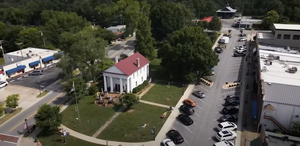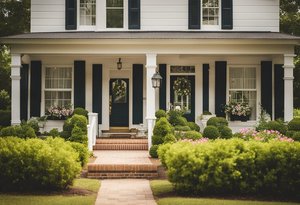Buying a home is one of the biggest financial decisions a person can make, and it can be an overwhelming process, especially for first-time homebuyers.
However, with the right guidance and preparation, buying a home can be a smooth and rewarding experience. This article provides a step-by-step guide for buying your first home in South Carolina, from understanding the housing market to closing the deal and moving in.
South Carolina is a state with a diverse range of housing options, from historic homes in Charleston to modern developments in Greenville. Understanding the housing market is crucial for first-time homebuyers.
This article will explore the current state of the South Carolina housing market, including median home prices, mortgage rates, and other relevant factors. It will also provide tips for buyers on how to prepare their finances and find the right location for their new home.
Key Takeaways
Understanding the South Carolina housing market is crucial for first-time homebuyers.
Preparing your finances and finding the right location are important steps in the homebuying process.
Choosing a reputable real estate agent and getting a home inspection and appraisal can help ensure a smooth closing process.
Understanding the South Carolina Housing Market
Before starting the home buying process, it is important to understand the current state of the South Carolina housing market. As of April 13, 2024, the median home price in South Carolina is $279,917, according to Norada Real Estate Investments. This is a decrease from the median list price of $344,940 recorded on February 29, 2024.
Despite this decrease in median home prices, the South Carolina housing market remains competitive. The state's consistent appreciation in housing values has led to a year-over-year increase of 6.5% in median home prices as of early 2024, according to Steadily. Additionally, the sales volume has shown resilience, with a slight rise in home sales of 0.7% compared to the previous year.
If you are considering buying a home in South Carolina, it is important to note that the market is currently experiencing an increased number of homebuyers, according to Builder People. The end of 2023 saw home listings in South Carolina go up by 8.3% compared to 2022, offering a promising outlook for 2024.
It is also worth noting that the South Carolina housing market varies by location. For example, the sought-after homes for sale in Greenville, SC, are currently experiencing a remarkable state of the market, according to Jeff Cook Real Estate. Therefore, it is important to research the specific area you are interested in to get a better understanding of the local market trends and conditions.
Preparing Your Finances
Buying a home is a significant financial investment, and it's essential to prepare your finances before you start the home-buying process. Here are some steps to take to ensure that you're financially ready to buy your first home in South Carolina:
Assessing Your Budget
Before you start looking for a home, it's crucial to assess your budget to determine how much you can afford. You should consider your monthly income, expenses, and debts to determine your monthly budget for a mortgage payment. It's recommended that your mortgage payment should not exceed 28% of your gross monthly income.
Saving for a Down Payment
One of the most significant expenses when buying a home is the down payment. In South Carolina, the average down payment is around 6% of the home's purchase price. It's essential to start saving for a down payment as soon as possible to ensure that you have enough money when it's time to buy a home. You can set up automatic savings plans or cut back on unnecessary expenses to save more money.
Checking Your Credit Score
Your credit score is an essential factor in determining your eligibility for a mortgage and the interest rate you'll receive. Before you start the home-buying process, you should check your credit score and address any issues to improve your score. A higher credit score can help you secure a better interest rate and save you thousands of dollars over the life of your mortgage.
Securing Pre-Approval for a Mortgage
Getting pre-approved for a mortgage can help you determine your budget and give you an advantage when making an offer on a home. Pre-approval involves submitting an application and providing documentation to a lender, who will then review your finances and credit history to determine how much they're willing to lend you. With pre-approval, you'll know exactly how much you can afford, and you'll be able to make a more competitive offer on a home.
Finding the Right Location
When it comes to buying your first home in South Carolina, finding the right location is crucial. Here are some key factors to consider when choosing the right neighborhood:
Researching Neighborhoods
Before you start looking at homes, it's important to research the neighborhoods you're interested in. Look for areas that fit your lifestyle and budget. Consider factors such as crime rates, property values, and proximity to amenities like grocery stores, restaurants, and parks. Websites like MoneyGeek and Houzeo offer useful guides to help you research neighborhoods in South Carolina.
Considering Schools and Amenities
If you have children or plan to have them in the future, it's important to consider the quality of schools in the area. Research the school district and check out the schools' ratings on websites like GreatSchools. It's also important to consider the availability of amenities like parks, libraries, and community centers. These can greatly enhance your quality of life and make your neighborhood feel like home.
Understanding Property Taxes
When buying a home in South Carolina, it's important to understand property taxes. Property taxes are calculated based on the assessed value of your home and can vary greatly depending on the location. Be sure to research the property tax rates in the areas you're interested in and factor them into your budget.
By considering these factors, you can find the right location for your first home in South Carolina.
Choosing a Real Estate Agent
When it comes to buying your first home in South Carolina, choosing the right real estate agent is crucial. A good agent can help you navigate the complex home buying process, find the right property, negotiate the best price, and guide you through closing. Here are some important things to consider when choosing a real estate agent.
Agent vs. Realtor
The terms "agent" and "realtor" are often used interchangeably, but they are not the same thing. A real estate agent is licensed to represent buyers and sellers in real estate transactions, while a realtor is a member of the National Association of Realtors (NAR), a professional organization that sets ethical standards for its members. While not all agents are realtors, all realtors are agents.
Interviewing Potential Agents
Before choosing a real estate agent, it's important to interview several candidates to find the one who is the best fit for you. Here are some questions to ask potential agents:
How long have you been a real estate agent?
What areas do you specialize in?
How many clients are you currently working with?
How do you communicate with your clients?
What is your commission rate?
Agent's Role in Home Buying Process
A good real estate agent can help you with every step of the home buying process, from finding the right property to negotiating the best price to closing the deal. Some of the tasks that a real estate agent can help you with include:
Helping you determine your budget and financing options
Finding properties that meet your criteria
Scheduling and attending property showings
Providing advice on making an offer and negotiating the price
Recommending home inspectors and other professionals
Assisting with the closing process
Overall, choosing the right real estate agent is an important step in buying your first home in South Carolina. By taking the time to interview potential agents and finding the one who is the best fit for you, you can ensure that you have a smooth and successful home buying experience.
House Hunting
Once you have been pre-approved for a mortgage and have a clear idea of your budget, it's time to start house hunting. This can be an exciting yet overwhelming process, but with some careful planning and preparation, you can find the perfect home for you. Here are some steps to follow:
Creating a Wish List
Before starting your search, create a wish list of what you are looking for in a home. This will help you narrow down your options and focus on homes that meet your needs. Consider factors such as location, size, number of bedrooms and bathrooms, yard space, and any other features that are important to you.
Attending Open Houses
Attending open houses is a great way to get a sense of what is available in your desired area. It's important to attend as many open houses as possible to get a good feel for the market and what you can expect in your price range. Take notes and pictures of each home to help you remember the details later on.
Evaluating Potential Homes
Once you have attended several open houses and have a list of potential homes, it's time to evaluate each one more closely. Consider factors such as the condition of the home, any necessary repairs or renovations, and the overall value of the property. It's also important to consider the neighborhood and any amenities that are important to you, such as schools, parks, and shopping.
By following these steps, you can make the house hunting process more manageable and find the perfect home for you. Remember to stay within your budget and take your time to find a home that meets all of your needs and preferences.
Making an Offer
Once you've identified the property you want to buy, it's time to make an offer. Making an offer is a critical step in the home buying process, and it's important to understand all the components of an offer to make a competitive bid.
Understanding Offer Components
An offer to purchase a home typically includes the purchase price, financing terms, and a closing date. It's important to research comparable home sales in the area to determine a fair market value for the property you're interested in. This will help you make a competitive offer that is both attractive to the seller and realistic for your budget.
In addition to the purchase price, financing terms, and closing date, an offer may include other components, such as a deposit, earnest money, or an option period. It's important to fully understand all the components of an offer before submitting it to the seller.
Negotiating Terms
Negotiating the terms of an offer can be a delicate process. It's important to work closely with your real estate agent to determine the best approach for your specific situation. In some cases, offering a higher purchase price or a shorter closing date may be more attractive to the seller. In other cases, offering a larger deposit or earnest money may demonstrate your commitment to the purchase.
Contingencies and Disclosures
An offer may also include contingencies and disclosures. Contingencies are conditions that must be met before the sale can be completed, such as a satisfactory home inspection or appraisal. Disclosures are statements made by the seller about the condition of the property, such as any known defects or repairs.
It's important to carefully review all contingencies and disclosures before submitting an offer. Your real estate agent can help you understand the implications of each contingency and disclosure and determine which ones are appropriate for your situation.
Making an offer is a critical step in the home buying process. By understanding all the components of an offer, negotiating terms effectively, and carefully reviewing contingencies and disclosures, you can make a competitive bid that is both attractive to the seller and realistic for your budget.
Home Inspection and Appraisal
When buying a home in South Carolina, it's important to schedule a home inspection and appraisal to ensure that the property is in good condition and that you're paying a fair price. Here are the steps to follow:
Scheduling a Home Inspection
Once the seller has accepted your offer, it's time to schedule a home inspection. The inspection will typically cost between $300 and $500, depending on the size and location of the property. It's important to hire a reputable inspector who will thoroughly examine the property for any issues.
During the inspection, the inspector will examine the property's major systems, such as the electrical, plumbing, and HVAC systems, as well as the roof, foundation, and other structural components. They will also look for any signs of water damage, mold, or pest infestations.
Reviewing the Appraisal Report
After the inspection, it's time to review the appraisal report. The appraisal will typically cost between $300 and $500, depending on the size and location of the property. The appraisal report will provide an estimate of the property's value based on factors such as its location, size, and condition.
It's important to review the appraisal report carefully to ensure that you're paying a fair price for the property. If the appraisal comes in lower than the agreed-upon purchase price, you may need to renegotiate with the seller or come up with additional funds to cover the difference.
Addressing Issues Pre-Closing
If the inspection or appraisal report uncovers any issues with the property, it's important to address them before closing. Depending on the severity of the issues, you may need to negotiate with the seller to have them repaired or replaced, or you may need to walk away from the deal.
It's important to work with your real estate agent and attorney to ensure that any issues are addressed before closing. This will help ensure that you're getting a fair deal on the property and that you're not stuck with any unexpected repairs or expenses after closing.
Closing the Deal
Closing the deal on a house can be an exciting and nerve-wracking time. This is when all the hard work of finding the perfect home and securing a mortgage comes to fruition. Here are some important steps to consider when closing the deal on your first home in South Carolina.
Finalizing the Mortgage
Before closing on a house, it's important to finalize the mortgage. This means ensuring that all the necessary documents have been signed and that the lender has approved the loan. It's also important to review the details of the mortgage, such as the interest rate and payment schedule, to ensure that everything is in order.
Closing Costs Explained
Closing costs are fees associated with the purchase of a home that are paid at the closing of the transaction. These costs can include appraisal fees, title insurance, and attorney fees, among others. It's important to understand these costs and budget accordingly. According to NewHomeSource, the average closing costs in South Carolina are around $3,700.
Signing the Paperwork
At the closing, the buyer will be required to sign a number of documents, including the mortgage agreement, the deed, and various other legal documents. It's important to read through these documents carefully and ask any questions you may have before signing. This is also a good time to review the closing costs and ensure that everything is in order.
In conclusion, closing the deal on a house can be a complex and stressful process, but with the right preparation and guidance, it can also be a rewarding and exciting time. By finalizing the mortgage, understanding the closing costs, and carefully reviewing and signing all the necessary documents, buyers can ensure a smooth and successful closing on their first home in South Carolina.
Moving In
Congratulations, you've bought your first home in South Carolina! Now it's time to move in and start making it your own. Here are a few things to keep in mind as you start the moving process.
Setting Up Utilities
Before you move in, you'll need to set up utilities such as electricity, gas, and water. It's a good idea to contact the utility companies a few weeks before you move in to ensure that everything is set up and ready to go on move-in day. You should also consider setting up internet and cable if you plan on using those services.
Homeowner's Insurance
One of the most important things you can do as a new homeowner is to purchase homeowner's insurance. This will protect your investment in case of damage or loss due to events such as fire, theft, or natural disasters. It's a good idea to shop around and compare quotes from different insurance companies to ensure that you're getting the best coverage at the best price.
Planning the Move
Moving can be a stressful and overwhelming process, but with a little planning, you can make it go smoothly. Start by creating a moving checklist and timeline to keep track of everything you need to do before, during, and after the move. You should also consider hiring a professional moving company to help with the heavy lifting and ensure that your belongings arrive safely at your new home.
Overall, moving into your first home in South Carolina can be an exciting and rewarding experience. By taking the time to set up utilities, purchase homeowner's insurance, and plan your move, you can ensure that everything goes smoothly and enjoy your new home to the fullest.
Frequently Asked Questions
What are the minimum requirements to purchase a home in South Carolina?
To purchase a home in South Carolina, there are certain minimum requirements that must be met. These include having a stable source of income, a good credit score, and a down payment. In addition, lenders may require that the borrower has a debt-to-income ratio of 43% or less.
What steps should a first-time home buyer take to begin the process in South Carolina?
The first step for a first-time home buyer in South Carolina is to determine their budget and get pre-approved for a mortgage. They should also research different neighborhoods and work with a real estate agent to find a suitable home. Once they have found a home, they will need to make an offer, have the home inspected, and close the sale.
How can a first-time home buyer in South Carolina qualify for a USDA loan?
To qualify for a USDA loan, a first-time home buyer in South Carolina must meet certain income requirements and be purchasing a home in a USDA-eligible area. They must also have a credit score of at least 640 and be able to demonstrate a stable source of income.
Is it possible to buy a house in South Carolina with no down payment?
Yes, it is possible to buy a house in South Carolina with no down payment by qualifying for a VA or USDA loan. However, these loans have specific eligibility requirements that must be met.
What is the typical down payment percentage for a home purchase in South Carolina?
The typical down payment percentage for a home purchase in South Carolina is 3% to 20% of the purchase price. The exact percentage will depend on factors such as the borrower's credit score and the type of loan they are using.
Can you outline the initial steps one must take when looking to buy their first house?
The initial steps for someone looking to buy their first house in South Carolina include determining their budget, getting pre-approved for a mortgage, researching neighborhoods, and working with a real estate agent. Once they have found a suitable home, they will need to make an offer, have the home inspected, and close the sale.







